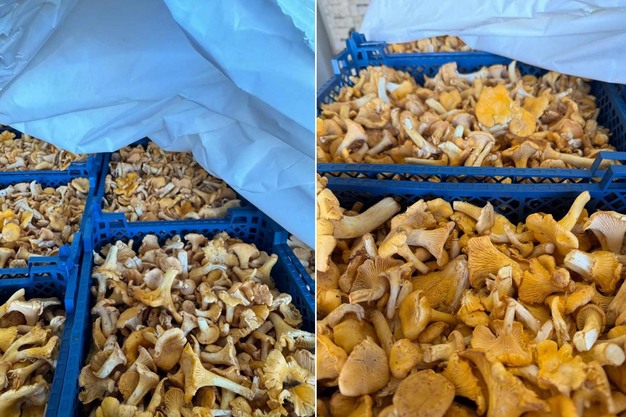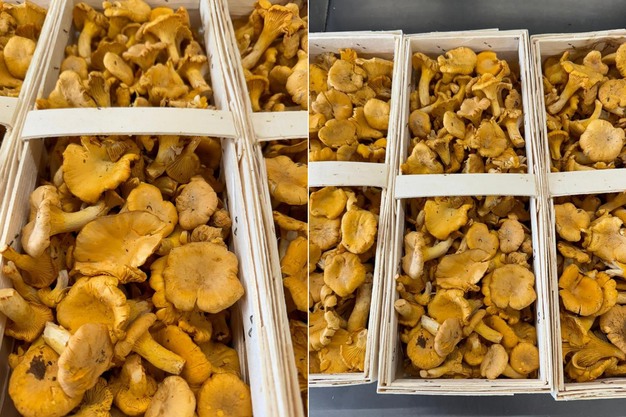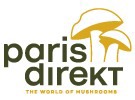The first Estonian chanterelles of this season arrived in Germany in the last week of July. "We are trading Estonian chanterelles alongside Lithuanian produce, which is now becoming increasingly scarce, and will also be offering Swedish chanterelles later on. The northern European produce is around 20-30 per cent more expensive than the Balkan chanterelles, but is somewhat yellower and finer in quality. Due to the cooler climate in Estonia, there are also hardly any problems with sunburn, which in turn means that less effort is required to clean the produce accordingly and there is less waste overall. Overall, we have noticed that Estonian produce is increasingly establishing itself as a gourmet product and is particularly popular with gourmets and in high-end restaurants," says Ramazan Gülnar, mushroom wholesaler and managing director of Paris Direkt Ltd in Münster, who has been offering chanterelles from Estonia for the third year in a row.
The Münster-based mushroom wholesaler now offers its customers in Germany and abroad fresh chanterelles from all over the world all year round. The Moroccan season is followed by the Portuguese campaign, and from April business slowly picks up with goods from Macedonia and Serbia. The arrival of Bulgarian and Romanian wild mushrooms marks the start of the classic peak season. "However, we have noticed that the peak season tends to start earlier and that chanterelles are increasingly being used as a spring item alongside asparagus." Gülnar has been observing this trend for a few years now.
 © Paris Direkt GmbHFine chanterelles from Estonia. The slower growth process gives the chanterelles comparatively more flavour and a firmer consistency.
© Paris Direkt GmbHFine chanterelles from Estonia. The slower growth process gives the chanterelles comparatively more flavour and a firmer consistency.
Lower margins jeopardise the wild mushroom sector
According to Gülnar, the start of this year's season was rather bumpy. "In terms of quality, the start to the season was incomparable to last year. It was also persistently wet in Romania and Bulgaria, which had a negative impact on the chanterelles. In Bulgaria in particular, this contributed to an overall short supply of goods. Fortunately, Lithuania started a little earlier than in other years." It is difficult to estimate how long the northern European chanterelle campaign will last. "Last year, we offered Estonian produce right into December. Even in Spain and Portugal, chanterelles were still available in November, but there was a lack of demand for produce from these countries of origin. In this respect, the wild mushroom business is always good for a surprise." Due to increased labour and logistics costs, margins along the supply chain have continued to decline overall, the mushroom expert continues.
In addition to chanterelles, porcini mushrooms are also traditionally very popular from late summer. "In many places in Romania, porcini mushrooms are already being collected diligently, but for quality reasons they have mainly been used in the industry and less on the fresh market. Last year, we offered Romanian porcini mushrooms from 10 August. In Bulgaria, on the other hand, porcini mushrooms are tending to lose market share for two reasons: Firstly, nature simply doesn't provide much anymore. In other words, there are fewer porcini mushrooms every year. Secondly, it is also becoming increasingly difficult to get enough people to collect them from the wild."

Chanterelles in the tried and tested wooden trays.
Setting the course contributes to the pleasing sales trend
In recent years, Paris Direkt has gradually developed into a full-range supplier of mushroom products. In order to continue to grow in the highly competitive market segment, strategic decisions were essential. "We now only offer our customers Dutch instead of Polish mushrooms. Although these are slightly more expensive to procure, the quality justifies the higher price. We are currently seeing a good price-performance ratio for mushrooms, which is reflected in the correspondingly high demand. The catering trade has slowed down somewhat due to the weather, while we have supplied more to canteen kitchens and communal catering. Across all product ranges, we were able to increase sales by almost a third in Q1 and Q2 compared to the same period last year. We are also helped by the expansion of our delivery area: during the holiday season, we generally move less volume in NRW as many people go on holiday. However, we also deliver to the Baltic Sea and to southern and eastern Germany, so we also benefit from tourism and the whole thing balances out again."
For more information:
Ramazan Gülnar
Paris Direkt GmbH
Lise-Meitner Straße 7b
48161 Münster
Tel 02534 977540
Fax 02534 977541
info@paris-direkt.net
www.paris-direkt.net
